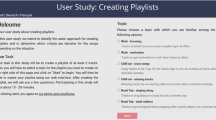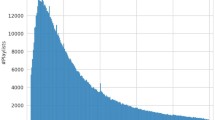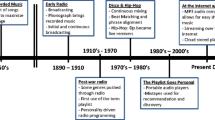Abstract
Algorithms for automatic playlist generation solve the problem of tedious and time consuming manual selection of musical playlists. These algorithms generate playlists according to the user’s music preferences of the moment. The user describes his preferences either by manually inputting a couple of example songs, or by defining constraints for the choice of music. The approaches to automatic playlist generation up to now were based on examining the metadata attached to the music pieces. Some of them took also the listening history into account. But anyway, a heavy accent has been put on the metadata, while the listening history, if it was used at all, had a minor role. Missings and errors in metadata frequently appear, especially when the music is acquired from the Internet. When the metadata is missing or wrong, the approaches proposed so far cannot work. Besides, entering constraints for the playlist generation can be a difficult activity. In our approach we ignored the metadata and focused on examining the listening habits. We developed two simple algorithms that track the listening habits and form a listener model—a profile of listening habits. The listener model is then used for automatic playlist generation. We developed a simple media player which tracks the listening habits and generates playlists according to the listener model. We tried the solution with a group of users. The experiment was not a successful one, but it threw some new light on the relationship between the listening habits and playlist generation.






Similar content being viewed by others
References
Apple Corporation, iTunes, http://www.apple.com/itunes/smartplaylists.html
Aucouturier JJ, Pachet F (2002, July 3–5) Scaling up music playlist generation. Poster Session on the 3rd CIRP International Seminar on Intelligent Computation in Manufacturing Engineering, Ischia (Naples), Italy
Blaukopf K (1992) Musical life in a changing society. Amadeus, Portland, Oregon, US
Breese J, Heckerman D, Kadie K (1998, July) Empirical analysis of predictive algorithms for collaborative filtering. In Proc. of the Fourteenth Conference on Uncertainty in Artificial Intelligence, Madison, Wisconsin, Morgan Kaufmann
Glover F, Laguna M (1993) Tabu search. In: Reeves CR (ed) Modern heuristic techniques for combinatorial problems. Blackwell, Oxford, pp 70–150
Hargreaves DJ, North AC (eds) (1997) The social psychology of music. Oxford University Press, New York, US
Konecni V (1982) Social interaction and music preference. In: Deutsch D (ed) The psychology of music. Diana Deutsch, Academic Press, Inc ISBN 0-12-213560-1
Pauws S, Eggen B (2002, October 13–17) PATS: Realization and user evaluation of an automatic playlist generator. In: Proc. of the 3rd International Conference on Music Information Retrieval (ISMIR 2002), IRCAM-Centre Pompidou, Paris, France
Peynircioglu ZF, Tekcan AI, Wagner JL, Baxter TL, Schaffer SD (1998) Name or hum that tune: feeling of knowing for music. Mem Cogn 26(6):1131–1137
Platt J, Burges C, Swenson S, Weare C, Zheng A (2002) Learning a Gaussian process prior for automatically generating music playlists. In: Proc. of Advances in Neural Information Processing Systems 14, pp 1425–1432
Sinha R, Swearingen K (2002, April) The role of transparency in recommender systems. In: Proc. of ACM CHI 2002 Conference on Human Factors in Computing Systems Conference Companion
Wang C, Jianzhong L, Shengfei S (2002, October 13–17) A kind of content-based music information retrieval in a peer-to-peer environment. In Proc. of the 3rd International Conference on Music Information Retrieval (ISMIR 2002), IRCAM-Centre Pompidou, Paris, France
Williams CKI, Rasmussen, CE (1996) Gaussian processes for regression. In: NIPS 8:514–520
Acknowledgments
This project has been partially supported by the Italian National Research Council in the frame of the Finalized Project “Cultural Heritage” (Subproject 3, Topic 3.2, Subtopic 3.2.2, Target 3.2.1) and by Italian MIUR (FIRB “Web-Minds” project N. RBNE01 WEJT_005). Authors are indebted to the participants in the evaluation process of the R’n’P software.
Author information
Authors and Affiliations
Corresponding author
Appendix. A questionnaire example
Appendix. A questionnaire example
Questionnaire
*
This questionnaire is about your listening habits. It is written as a short story in which you have to fill the gaps. The gaps are marked with ??????. Please replace them with what you think there should stand, and send the filled questionnaire to the address aandreja@dico.unimi.it
Here goes:
*
... and so, one day, you saw an advertisement on the Internet about a fabulous new media player which can adjust to your personal taste and generate the playlists automatically for you. Good grace!—you said, this can’t be true! So you downloaded the player, just to see if what was said is true. Of course, in the user guide you saw also hat it takes some time for the player to “get in pace” with your tastes and moods. So, patiently, you listened to some of your preferred music for several days. Finally, after a week or so, you decided to try the thing out. You entered manually one piece. It was
*
Celine Dion—All By Myself
*
and afterwards, you pressed the red button. Instantly, the list was filled with some other pieces. The generated list consisted of the following pieces:
*
Celine Dion—All By Myself
Alanis Morissette—Creep—radiohead cover live
Skin—Trouble With Me
Alanis Morissette—Question (Tricky Feat. Alanis)
Marina Rei—I miei complimenti
Skin—As Long As Thats True
Alanis Morissette—11—There Are Worse Things I Could Do
Beatles Cover—Alanis Morrissette—Dear Prudence
mtv unplugged—king of pain
Skin—Lost Without You
*
Immediately after, a dialog box appeared on the screen, asking you to give a mark from 0 to 10 to the generated playlist (0-disgusting, 10-excellent, other marks gradually fill this gap) in order to help it improve its working. Ok. You gave the mark ??????.
In the manual you saw that pressing the red button repeatedly you will get different playlists (on the basis of your hint songs, of course). So you pressed the red button again. The new list was:
*
Etta James—You Can Leave Your Hat On
Alanis Morissette—Forgive me love
Marina Rei—I miei complimenti
Drift Away—Alanis Morissette, Tom Petty, Ringo Starr & Steven Tyler
Celine Dion—All By Myself
Alanis Morissette—king of intimidation
Copia di Subsonica & Antonella Ruggero—Per Un Ora d’Amore
Alanis Morissette—Question (Tricky Feat. Alanis)
Alanis Morissette—Purgatorying
Alanis—Simple Together
*
A dialog box appeared again on the screen, asking you to give a mark from 0 to 10, so you gave the mark ??????.
You decided to press the button repeatedly until you see all the possibilities. The next list was:
*
Mina—AudioTrack 02
Mina—Ancora ancora ancora
mtv unplugged—king of pain
4 Non Blondes—Morphine and Chocolate
Copia di Subsonica & Antonella Ruggero—Per Un Ora d’Amore
Etta James—You Can Leave Your Hat On
Loredana Bert—Sei bellissima
Marina Rei—I miei complimenti
Ozzy Osbourne—Goodbye To Romance
Paola Turci—Mani giunte
Celine Dion—All By Myself
*
You gave the mark ?????? to this list. “Let’s try something different now”—you said. So you deleted the playlist and entered manually a new piece.
It was:
*
Smackwater jack
*
You pressed the red button, and the list filled with the following pieces:
*
Smackwater jack
JOPLIN Janis—Get It While You Can
4 Non Blondes—What’s Up (Piano Version)
Gamma Ray—The Silence
Mia Martini—Minuetto
Copia di Subsonica & Antonella Ruggero—Per Un Ora d’Amore
Marina Rei—I miei complimenti
Skin—Trashed
Tori Amos—Northern Lad
Skin—Burnt Like You
Skin—I’ll Try
Drift Away—Alanis Morissette, Tom Petty, Ringo Starr & Steven Tyler-
Ozzy Osbourne—Goodbye To Romance
*
In the dialog box you entered the following mark: ??????.
You subsequently pressed the red button, and the list was different.
It was:
*
Smackwater jack
Skin—Trashed
Tori Amos—Northern Lad
Alanis Morissette—Forgive me love
Copia di Subsonica & Antonella Ruggero—Per Un Ora d’Amore
Alanis Morissette—Unprodigal Daughter
Michael Kiske—Always
mtv unplugged—king of pain
Alanis—Simple Together
Alanis Morissette—Offer
Alanis Morissette—Purgatorying
Alanis Morissette—Sorry To Myself
Skin—Dont Let Me Down
Skin—Burnt Like You
*
The mark that you gave to this list was: ??????.
After that you pressed the red button one more time, and you got the following list:
*
Alanis Morissette—Sorry To Myself
Smackwater jack
Alanis—Simple Together
Alanis Morissette—Unprodigal Daughter
Alanis Morissette—Offer
Tori Amos—Northern Lad
Michael Kiske—Always
Alanis Morissette—Purgatorying
Skin—Trashed
Alanis Morissette—Still (Dogma)
Mia Martini—Minuetto
Alanis Morissette—king of intimidation
*
You marked this list with: ??????.
After all this you said: “What a ?????? program!”
(In the terms of that dialog box, your comment would be translated to the mark ??????).
End of the story.
Rights and permissions
About this article
Cite this article
Andric, A., Haus, G. Automatic playlist generation based on tracking user’s listening habits. Multimed Tools Appl 29, 127–151 (2006). https://doi.org/10.1007/s11042-006-0003-9
Published:
Issue Date:
DOI: https://doi.org/10.1007/s11042-006-0003-9




